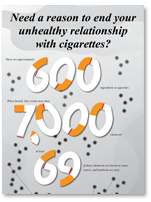It’s Time to End Your Unhealthy Relationship with Tobacco
Name one positive thing that tobacco has added to your life. Most likely, you’re coming up empty. It’s probably easier to name things that tobacco has taken away from you — starting with your money and your health. Isn’t it time to rid your life of tobacco for good?
Imagine Your Life without Tobacco
Tobacco smoke contains a deadly mix of more than 7,000 chemicals — hundreds are toxic and approximately 70 cause cancer. When you stop smoking, you greatly reduce your risk for a number of diseases as well as premature death. Here’s a closer look at what happens to your body when you end your relationship with tobacco:
- Lowered risk for lung cancer and many other types of cancer.
- Reduced risk for heart disease, stroke and peripheral vascular disease.
- Reduced respiratory symptoms, such as coughing, wheezing and shortness of breath.
- Reduced risk of developing chronic obstructive pulmonary disease (COPD), one of the leading causes of death in the United States.
- Reduced risk for infertility in women of reproductive age. Women who stop smoking during pregnancy also reduce their risk of having a low birth weight baby.
Why Is It So Hard to Say Goodbye?
If you’re a smoker, chances are you’re familiar with the risks. There’s also a chance that you want to quit or have already tried to quit unsuccessfully. In fact, 68 percent of current U.S. adult smokers report they want to quit completely. So, why is it so hard?
If there’s a voice inside your head telling you it’s impossible to quit — it’s not you, it’s the nicotine talking. An important part of quitting is to recognize the influence that nicotine has on your mind and body:
- Nicotine dependence is the most common form of chemical dependence in the United States. Research suggests that nicotine may be as addictive as heroin, cocaine or alcohol.
- Symptoms of nicotine withdrawal may include irritability, anxiety, difficulty concentrating, cravings for a cigarette and increased appetite.
- Because of nicotine, quitting is difficult and may require several attempts. Users often return to smoking because of withdrawal symptoms, stress and weight gain.
You’re Better Than Tobacco. Take Back Your Freedom!
Today, the number of former smokers exceeds the number of current smokers. You can quit, too! To be successful, it’s important to develop a plan for quitting your way. While some people are able to quit on their own, others may benefit from group support, health coaching or medication. Whatever you do, don’t give up. There’s more than one way to quit. Most people benefit from using more than one type of treatment:
- Clinical intervention (advice from a medical doctor)
- Small group and large group counseling
- One-on-one quit coaching
- Programs delivered through a mobile app
- Nicotine replacement products: over-the-counter and prescription
- Non-nicotine medications

